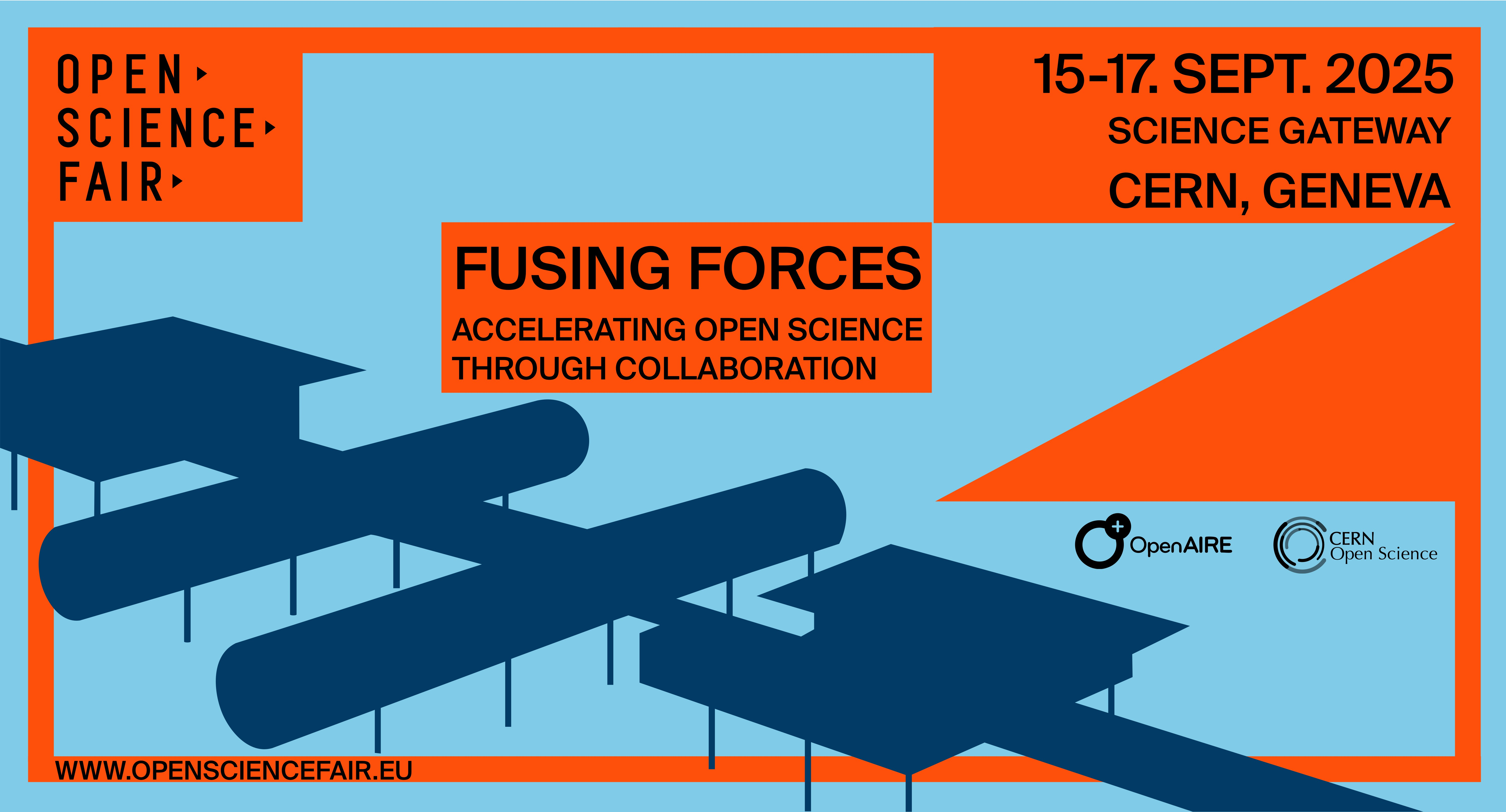-
Opening day
-
Submission deadline
Open Science Fair 2025
The call for contributions is closed. Please consider registering for the conference.
Fusing Forces – Accelerating Open Science through Collaboration
The fifth edition of OSFair will be held from 15th to 17th September 2025 at the CERN Science Gateway in Geneva, Switzerland, hosted by the CERN Open Science Office and co-organised with OpenAIRE.
This year’s Open Science Fair will explore how diverse forms of collaboration can accelerate discovery, enhance knowledge accessibility, and create a more transparent and equitable research ecosystem. By fostering open and inclusive cooperation across continents, we can build a stronger, more connected scientific community.
The OS FAIR welcomes all actors of the research communities and infrastructures, including: librarians, repository managers, content providers, service providers, research administrators, facilitators of research, learned societies, publishers, policy makers and funders, citizen science groups and initiatives, and innovators in scholarly communication.
Conference Topics
We invite you to share updates and developments on open science initiatives within your organisations or countries / regions. ‘Open Science’ encompasses a range of elements, including established practices like open access to research outputs (such as publications, data, and software) and emerging aspects like open research methods, open evaluation, societal engagement, citizen science, and more. Successful proposals will make issues around collaboration explicit, for example: what can collaboration between various stakeholders, services, and infrastructures look like, and how can collaboration be enabled and facilitated?
You are encouraged to discuss and highlight practical experiences (both positive and negative). The presentation of demonstrations and prototypes are welcome.
Your contribution should be aligned with one of the main conference topics:
- Beyond Compliance: Measuring and Maximizing Open Science Impact
- Open, but at What Cost? Research Security & Open Science
- Building the Digital Backbone: Open Science Infrastructures
- Rethinking Research Assessment
- Open Science for All: Skills & Community
More information about the conference topics can be found here. Several topics will be present at the conference as cross-cutting topics. In particular, these are AI in Open Science and Policies for Equity & Inclusion. There are no tracks for these topics, but we encourage you to include these topics to wherever you see fit.
Contribution Types
There are four different types of contributions you can submit:
- Individual Presentations
- Panels
- Collaborative Workshops
- Posters and Demos
In the following, each contribution type is described in more detail:
Individual Presentations
The presentation should be 40 minutes with a maximum of 30 minutes of talk and at least 10 minutes time for questions and discussion. If you submit an individual presentation, your contribution will share a session with another individual presentation from the same or a similar track.
Panels
A panel session lasts 90 minutes and can have two or three speakers and at least 30 minutes of Q&A with the audience. The panel should include a moderated discussion among the panelists.
Collaborative Workshops
There will be slots for workshops of 180 minutes, with possibilities to do focused work on a specific topic. These slots are entirely committed to the conference theme of collaboration. Choose this contribution type if you want to work with a group of maximum 30 people on a tool, on guidelines, on a statement, or anything else.
Posters and Demos
The session for posters and demos will take place during the reception on Monday evening. Posters, preferably in format A0 will be displayed for networking and engagement opportunities. Instead of a classical poster, we also invite you to submit a proposal for a demo. This can be a tool, a website, or anything you have been working on and want to show to the community. All materials presented in this session will be published online after the conference through Zenodo.
Note that the call for posters and demos will close two weeks later than the one for any other contributions.
Evaluation
Proposals will be evaluated primarily on their potential to stimulate interesting discussions, facilitate the exchange of ideas, and promote collaborations. Additional criteria are:
- Relevance
- Impact on the wider community
- Level of innovation
- Originality
- Openness and FAIR-ness of the solution / method / product
- Interaction with the audience
- Quality of the abstract
Special consideration will be given to ensure that a variety of topics and geographical / cultural range will be represented.
Applications will be evaluated by the Conference Programme Committee.
Travel support
We can offer limited travel support for speakers from low and middle income countries. If you would like to benefit from this support, please reach out to us. The decision on granting of travel support will be taken by the Program Committee after the decision for contributions, that means until end of May. Priority will be given to presenters of collaborative workshops, then to speakers at individual presentations and panels, and then to presenters of posters.
